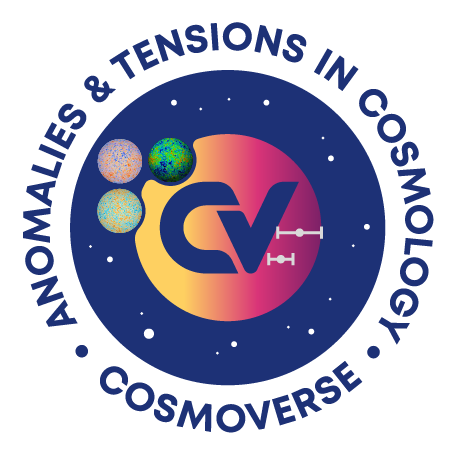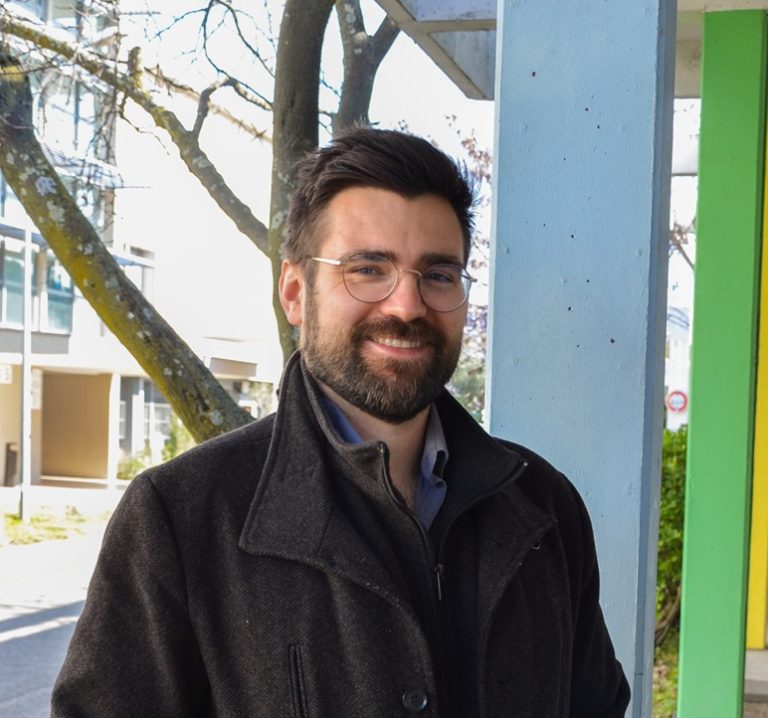What is your name, affiliation, academic position, and job title?
Vivian Poulin (I also go by Vivian Poulin-Détolle, after my dad), I work for CNRS and I am based at the Laboratoire Univers et Particules de Montpellier (LUPM). I am officially a staff researcher.
What is your journey? (Where did you live, learn and work?)
I studied in the French Alps mostly, first in Grenoble for my undergraduate studies at the Université Joseph Fourier, and then in Annecy for my PhD at the “Laboratoire d’Annecy-le-vieux de Physique Théorique”. I spent one year in Heidelberg during my master, and one year in Aachen during my PhD as part of a joint PhD program (both are cities in Germany). I then worked in Baltimore, USA at the Johns Hopkins University, and now in Montpellier.
What is your field of research and/or what project are you involved in?
Broadly speaking my field of research is about understanding dark matter (DM) and dark energy (DE). I am mostly working on cosmological aspects of DM and DE, but I am interested in the interplay with particle physics and astrophysics, given the great inter-disciplinary aspects of the quest for identifying the nature of DM and DE. I am a “theorist”, in the sense that I am not making observations myself, but I do work fairly close to data, mostly doing phenomenological searches, i.e., trying to build a bridge between abstract theories of DM and/or DE and the observations, by computing the signatures of interesting models onto our variety of cosmology observables.
What are your research plans?
“The plan is there is no plan!”. This is a joke of course – in practice, I am currently mostly interested in establishing the implications of recent cosmic tensions for the nature of DM and DE, in particular in the context of the “NewRecords” ERC grant for which I am the PI. Indeed, if these tensions are cosmological in nature, it is a good bet that they will be tied to the fundamental nature of these mysterious components of our universe. However, I do like to keep my options open, leave room to the unexpected, and, as said previously, develop connections with other fields of physics where DM and DE may play a role (again, in particle physics or astrophysics), or where my understanding of cosmological observables can be interesting (e.g., to constrain properties of neutrinos, of extensions to general relativity). What I like about my position is precisely not to be tied to a given experiment or research project for the next decade, I can therefore try to learn and make progress in various fields, even if loosely connected to my main field of research.
How does CosmoVerse fit within those plans?
CosmoVerse is a great platform to meet researchers, to learn from them, get new ideas, work on new projects that connects to cosmic tensions, present the work of my team to the community, and also develop long term scientific relationships with people from all over Europe and beyond.
What are the most exciting open questions in your research area?
Broadly speaking, it has to be identifying the nature of dark matter and dark energy. That is very generic and obvious of course. More technically, I believe the most pressing questions are precisely being addressed by the CosmoVerse action: namely, the question of whether current cosmic tensions we observe are “cosmological” in origin (as opposed to due to astrophysics/systematic errors), and if cosmological, what sorts of beyond-LCDM proprieties are required.
What advances or new results are you excited about or looking forward to?
In Cosmology we are very lucky to have a plethora of new experiments about to release results or starting to take data, such as DESI, Euclid, Vera Rubin Observatory on the large-scale structure side, and ACT, SPT, Simons Observatory on the CMB side. There are also interesting results coming from JWST that can help with cosmic tensions, and in the not-so-distant future, 21cm surveys will shed new lights on a yet unexplored era of the cosmos. In parallel of that, progress with gravitational wave detectors (ground based, space based, and even pulsar-timing arrays) will also allow us to learn about the cosmos. So generally, I am very excited for this giant effort to come to fruition, and see whether our standard cosmological model will still stand in 20 years, or whether the “cosmic tensions” we see today are indeed the first sign of a breakthrough in cosmology.
What is your view on cosmic tensions? How does your work connect with this open question in the community?
As I am not part of experiments making the measurements at the origin of the tensions, I try to stay away from taking a strong stand on whether cosmic tensions are “real” or due to systematic errors. However, I do find the questions raised by these tensions extremely interesting. I have always been working on understanding the properties on dark matter and dark energy at the interface between cosmology, particle physics, and astrophysics, and it is very exciting to start seeing a potential “signature” of the more fundamental nature of these mysterious components of the universe. I am now spending a lot of time building models to explain these tensions, and looking for signatures of promising models in current and future data to unambiguously confirm/exclude the origin of the cosmic tensions.
What role do you think a community network like CosmoVerse can play in developing theoretical astroparticle physics and cosmology?
I see CosmoVerse as a fantastic platform for scientists from many different countries and backgrounds to meet and discuss around a specific “hot” question in cosmology. It is a very nice way to expose our work, learn about other works, and develop new ideas for collaboration. It is also a very good way for the general public to learn about what are the current hot topics that attract a lot of scientists’ attention nowadays.
What is your favourite food? Why?
It will have to be one of the hundreds of cheese-based dish that we have in France! In Haute-Savoie, where I grew up, there’s a saying that states “in tartiflette we trust” and I certainly believe in this (although I eat the vegetarian version of the dish).
Your favourite scientist and/or science fiction film?
Recently I became quite fond of Interstellar after reading the “physics of interstellar” by kip Thorne. This was really a fantastic movie and much deeper in the physics than I understood upon first viewing of the movie.
How do you relax after a hard day of work?
I like to drink a glass of wine, cook with my wife and play with my young son and my crazy dog.
What non-physics interests do you have and want to share?
I recently became interested in American football and the game of “fantasy football”. You should ask people working with me, apparently, I can’t stop talking about it!
If you were not a scientist, what do you think you would be doing?
Maybe try a professional sports career if I wasn’t too bad at it. Or become a baker, and export “the” real French baguette in the US. That I could still do in the future!
What do you hope to see accomplished scientifically in the next 50 years?
I am very excited about the possibility of a scientific base on the moon! The possibility of building giant observatories on the moon is mind blowing to me.
In your view, what is the most important challenge that humanity faces currently?
At an “existential” level, it has to be climate change of course, but generally it seems we are facing a crisis in the understanding of science by the general public, that is connected to many recent issues, such as the reaction to covid vaccines, the lack of trust in “regular” media, and the rise of far-right populism everywhere in the world, among others, that we as scientists (even as theoretical cosmologist!) can play a major role in, by helping everyone understand what is science and how it works, help better define both its strengths, and its weaknesses, to avoid people loosing trust in the science community, and the real challenges to come.
What question would you have liked us to ask you, and what would you have answered?
I guess you could have asked me about my favorite way of explaining the tensions! But that I will keep off the record…!

